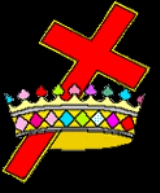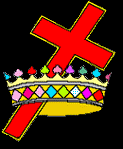
Royal Black Preceptory
Encyclopedia

It was formed in Ireland
Ireland
Ireland is an island to the northwest of continental Europe. It is the third-largest island in Europe and the twentieth-largest island on Earth...
in 1797, two years after the formation of the Orange Order
Orange Institution
The Orange Institution is a Protestant fraternal organisation based mainly in Northern Ireland and Scotland, though it has lodges throughout the Commonwealth and United States. The Institution was founded in 1796 near the village of Loughgall in County Armagh, Ireland...
in Daniel Winter's
Daniel Winter
Daniel "Dan" Winter is an American new age author, lecturer, computer graphics artist and sacred geometry researcher. Lecturing around the world, he has produced various books and over 50 videotapes on numerous subjects, including sacred geometry, geomancy, the origin of gravity, the fractal...
cottage, Loughgall
Loughgall
Loughgall is a small village and townland in County Armagh, Northern Ireland. In the 2001 Census it had a population of 285 people.Loughgall was named after a small nearby loch. The village is at the heart of the apple-growing industry and is surrounded by orchards. Along the village's main street...
, County Armagh
County Armagh
-History:Ancient Armagh was the territory of the Ulaid before the fourth century AD. It was ruled by the Red Branch, whose capital was Emain Macha near Armagh. The site, and subsequently the city, were named after the goddess Macha...
. The society is formed from Orangemen and can be seen as a progression of that Order although they are separate institutions. Anyone wishing to be admitted to the Royal Black Institution must first become a member of an Orange Order Lodge, and many are members of both. The Royal Black is often referred to as the senior of the loyal orders.
Its headquarters are in Lurgan
Lurgan
Lurgan is a town in County Armagh, Northern Ireland. The town is near the southern shore of Lough Neagh and in the north-eastern corner of the county. Part of the Craigavon Borough Council area, Lurgan is about 18 miles south-west of Belfast and is linked to the city by both the M1 motorway...
, County Armagh
County Armagh
-History:Ancient Armagh was the territory of the Ulaid before the fourth century AD. It was ruled by the Red Branch, whose capital was Emain Macha near Armagh. The site, and subsequently the city, were named after the goddess Macha...
. Members of the Order refer to each other as "Sir Knight" whereas in the Orange Order members are referred to as "Brother" or "Brethren". The Order's basis is the promotion of scripture and the principles of the Protestant Reformation
Protestant Reformation
The Protestant Reformation was a 16th-century split within Western Christianity initiated by Martin Luther, John Calvin and other early Protestants. The efforts of the self-described "reformers", who objected to the doctrines, rituals and ecclesiastical structure of the Roman Catholic Church, led...
. It has preceptories throughout the world, mainly in the major English speaking
Anglosphere
Anglosphere is a neologism which refers to those nations with English as the most common language. The term can be used more specifically to refer to those nations which share certain characteristics within their cultures based on a linguistic heritage, through being former British colonies...
countries, and is particularly strong in Newfoundland
Newfoundland and Labrador
Newfoundland and Labrador is the easternmost province of Canada. Situated in the country's Atlantic region, it incorporates the island of Newfoundland and mainland Labrador with a combined area of . As of April 2011, the province's estimated population is 508,400...
.
In Northern Ireland
Northern Ireland
Northern Ireland is one of the four countries of the United Kingdom. Situated in the north-east of the island of Ireland, it shares a border with the Republic of Ireland to the south and west...
it holds a very colourful annual parade
Parades in Northern Ireland
Parades are an important part of Northern Irish culture. Although the majority of parades are held ostensibly by Protestant, unionist or Ulster loyalist groups, nationalist, republican and non-political groups also parade. Parading is often considered to be an assertion of a group's control over a...
in the village of Scarva
Scarva
Scarva is a small village and townland in County Down, Northern Ireland. It is at the boundary with County Armagh, which is marked by the Newry Canal. In the 2001 Census it had a population of 320....
, County Down
County Down
-Cities:*Belfast *Newry -Large towns:*Dundonald*Newtownards*Bangor-Medium towns:...
on the 13th July (the day after the Orange Order's 12th July
The Twelfth
The Twelfth is a yearly Protestant celebration held on 12 July. It originated in Ireland during the 18th century. It celebrates the Glorious Revolution and victory of Protestant king William of Orange over Catholic king James II at the Battle of the Boyne...
celebrations). It is commonly referred to as The Sham Fight. The other major parade of the year is "Black Saturday", also known as "Last Saturday", held on the last Saturday in August at several locations throughout Northern Ireland. The Royal Black Institution has adopted a more conciliatory attitude to contentious parades than the Orange Order, and is less overtly political, though not without political influence. Apart from Northern Ireland
Northern Ireland
Northern Ireland is one of the four countries of the United Kingdom. Situated in the north-east of the island of Ireland, it shares a border with the Republic of Ireland to the south and west...
, the society is also popular in Scotland
Scotland
Scotland is a country that is part of the United Kingdom. Occupying the northern third of the island of Great Britain, it shares a border with England to the south and is bounded by the North Sea to the east, the Atlantic Ocean to the north and west, and the North Channel and Irish Sea to the...
, where 60 preceptories exist organised into 11 districts across the country. 26 marches by the Black Institution took place in Glasgow between 2009 and 2010
Degrees
The Royal Black Preceptory consists of eleven degrees, as follows: -(1) Royal Black Degree
(2) Royal Scarlet Degree
(3) Royal Mark Degree
(4) Apron and Royal Blue Degree
(5) Royal White Degree
(6) Royal Green Degree
(7) Gold Degree
(8) Star and Garter Degree
(9) Crimson Arrow Degree
(10) Link and Chain Degree
(11) Red Cross Degree
The Institution also possesses a final retrospective overview degree, which is essentially an overview of the 11 degrees that the candidate has traversed.
Sovereign Grand Masters
A list of Sovereign Grand Masters of the Royal Black Preceptory:- 1846: Thomas Irwin
- 1849: Morris Knox
- 1850: Thomas Johnston
- 1857: William Johnston
- 1902: H. W. Chambers
- 1914: William Lyons
- 1924: William AllenWilliam Allen (UK politician)Sir William James Allen was a Northern Irish unionist politician.He was elected to the British House of Commons at a by-election in 1917, as an Irish Unionist Party Member of Parliament for North Armagh, and retained his seat at the 1918 general election...
- 1948: Norman StrongeNorman StrongeCaptain Sir Charles Norman Lockhart Stronge, 8th Baronet, MC, PC , JP was a senior Unionist politician in Northern Ireland....
- 1971: Jim Molyneaux
- 1995: William Logan
- 2008: Millar Farr

